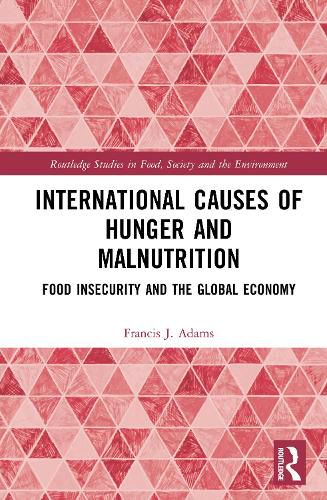Readings Newsletter
Become a Readings Member to make your shopping experience even easier.
Sign in or sign up for free!
You’re not far away from qualifying for FREE standard shipping within Australia
You’ve qualified for FREE standard shipping within Australia
The cart is loading…






This book examines the international causes of hunger and malnutrition and reveals how critical elements of the global economy heighten food insecurity in the developing world.
At present, over two billion people in the developing world do not have secure access to safe, sufficient and nutritious food. With the global population projected to rise to almost 10 billion by 2050, ensuring universal access to food will become increasingly urgent. The global community will need to redouble its efforts to effectively address the underlying causes of food insecurity. Within countries, a number of causes - poverty, poor governance, civil conflict, environmental decline - are immediately apparent and must be addressed to have any hope of lessening hunger and malnutrition. At the same time, a number of other factors well beyond national borders often constitute equal or greater obstacles to meeting the nutritional needs of all people. These factors are not nearly as visible and are largely outside the control of individual countries and local communities. This book examines how core elements of the global economy cause, prolong, and intensify food insecurity in the developing world. Emphasis is placed on agricultural trade, seed privatization, transnational land acquisitions, industrial fishing, and climate change. Understanding how these five factors impact the poorest communities in the poorest countries is essential for constructing an equitable, inclusive, and sustainable global food system that meets the nutritional needs of all people. By highlighting five major international causes of hunger and malnutrition, this book offers an alternate framework for understanding and combatting global food insecurity.
This book will be of particular interest to students, scholars, and practitioners in the fields of global food security, international development, and global political economy.
$9.00 standard shipping within Australia
FREE standard shipping within Australia for orders over $100.00
Express & International shipping calculated at checkout
This book examines the international causes of hunger and malnutrition and reveals how critical elements of the global economy heighten food insecurity in the developing world.
At present, over two billion people in the developing world do not have secure access to safe, sufficient and nutritious food. With the global population projected to rise to almost 10 billion by 2050, ensuring universal access to food will become increasingly urgent. The global community will need to redouble its efforts to effectively address the underlying causes of food insecurity. Within countries, a number of causes - poverty, poor governance, civil conflict, environmental decline - are immediately apparent and must be addressed to have any hope of lessening hunger and malnutrition. At the same time, a number of other factors well beyond national borders often constitute equal or greater obstacles to meeting the nutritional needs of all people. These factors are not nearly as visible and are largely outside the control of individual countries and local communities. This book examines how core elements of the global economy cause, prolong, and intensify food insecurity in the developing world. Emphasis is placed on agricultural trade, seed privatization, transnational land acquisitions, industrial fishing, and climate change. Understanding how these five factors impact the poorest communities in the poorest countries is essential for constructing an equitable, inclusive, and sustainable global food system that meets the nutritional needs of all people. By highlighting five major international causes of hunger and malnutrition, this book offers an alternate framework for understanding and combatting global food insecurity.
This book will be of particular interest to students, scholars, and practitioners in the fields of global food security, international development, and global political economy.